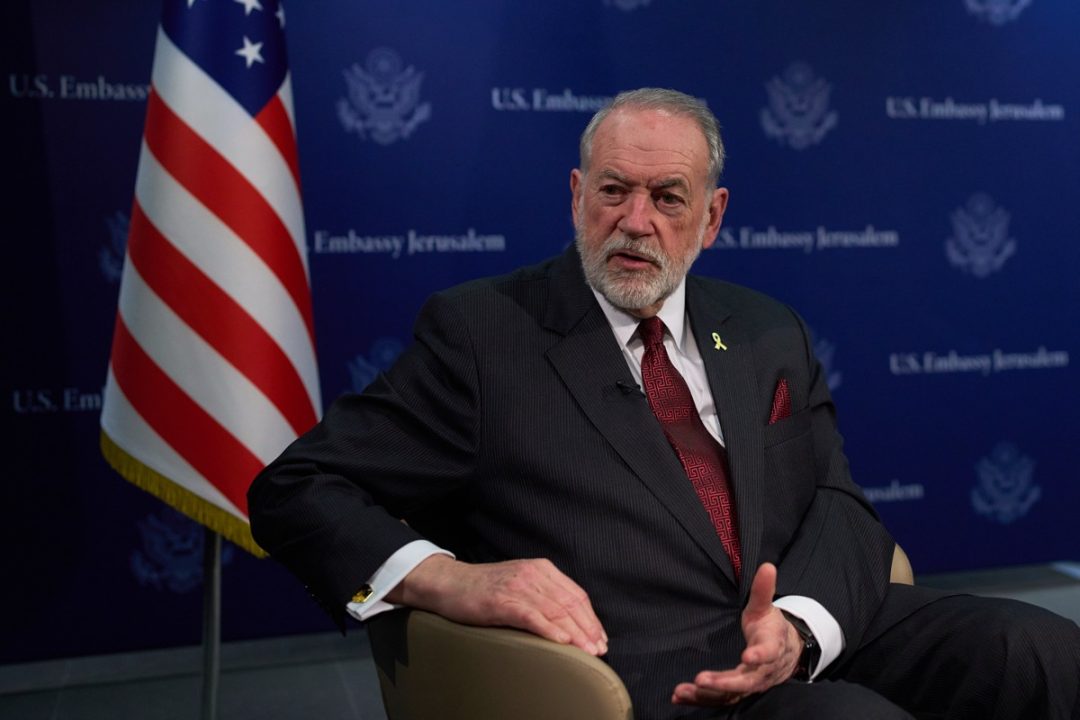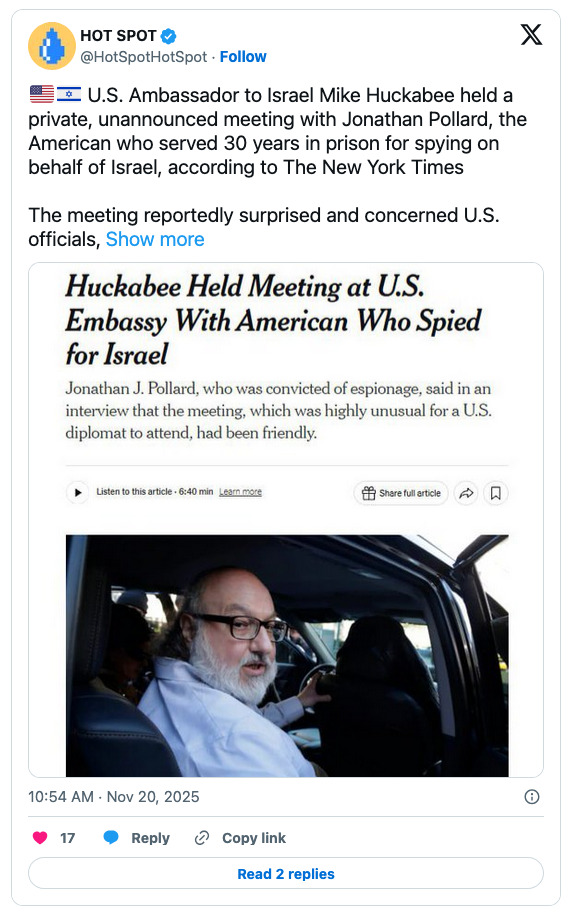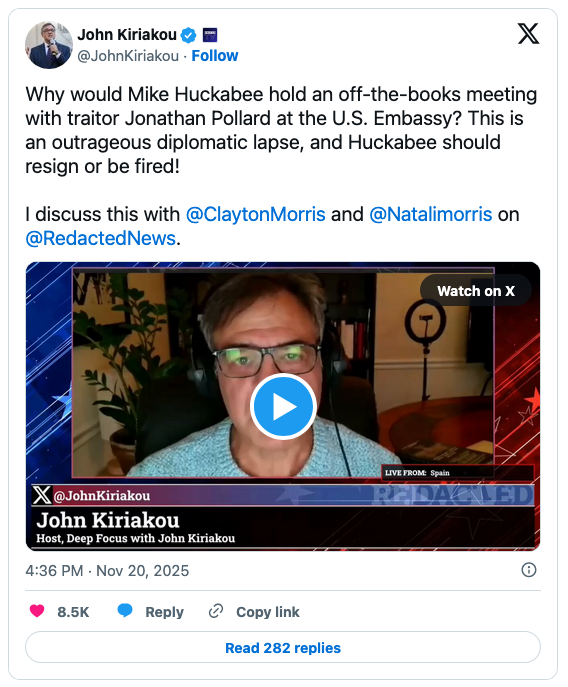
U.S. Ambassador to Israel Mike Huckabee met with American traitor and convicted Israeli spy Jonathan Pollard in Jerusalem.
The meeting at the U.S. embassy in July left American officials dumbfounded, The New York Times reported, and seemed to give Pollard a pass on his conviction in 1987 for passing classified information to Israel. U.S. officials believed Israel passed the secrets to the Soviet Union.
But Huckabee apparently thinks Pollard, a Navy intelligence analyst when he was caught, did nothing wrong. When Huckabee ran for president in 2011, he pushed for Pollard’s release.
The meeting, the Times reported, “alarmed” American officials in Israel. It should have. President Trump knew nothing about it.

The Meeting
The meeting was, not surprisingly, a secret, the Times reported, and for good reason. No other American envoy thought meeting with Pollard was a good idea.
“The highly unusual meeting caught some U.S. officials by surprise, and appeared to be a sharp break with years of precedent for American diplomats,” the newspaper revealed:
The New York Times learned of the meeting from three U.S. officials who spoke on the condition of anonymity to discuss sensitive information. When The Times asked Mr. Pollard about the meeting, he confirmed it.
The meeting was not on Huckabee’s schedule, which “alarmed” the CIA station chief.
And the top U.S. spy in Israel isn’t the only American official that Huckabee kept in the dark, the Times continued:
The White House was not aware of the meeting in advance, according to a White House official and two people briefed on the matter. The White House official also said that senior officials there were alarmed when they learned it had taken place.
Nor was President Trump aware, spokesman Karoline Leavitt confessed. “The White House was not aware of that meeting, but the president stands by our ambassador, Mike Huckabee, and all that he’s doing for the United States and Israel,” she said.
Pollard told international news network i24 that “anti-Israel” forces inside the White House leaked details of the meeting:
The New York Times story was part, or is part, of an effort to discredit the ambassador and have him removed, and I think the people behind this are anti-Israel elements within the Trump administration, the neo-isolationists … and others, perhaps pro-Saudi, pro-Qatari elements within the administration that would like to see a person like Ambassador Huckabee sent home.

Pollard’s Treachery
Though sentenced to life in prison, Pollard was paroled in 2015. With this second wife in tow, the turncoat landed in Israel to what the Times called a “hero’s welcome” on December 30, 2020. He kissed the ground when he arrived, and declared that “we’re ecstatic to be home after 35 years.”
Apparently, though Pollard was an American, his real loyalty was never in doubt. “Between 1984 and 1985, Mr. Pollard gave a range of classified documents to Israel,” the Times recalled:
Caspar Weinberger, the secretary of defense when Mr. Pollard was arrested in 1985, wrote that Mr. Pollard had handed over so many documents that they could fill a space 6 feet by 6 feet by 10 feet. His actions, Mr. Weinberger said, compromised U.S. intelligence sources and risked endangering American forces deployed around the world.
“The defendant has substantially harmed the United States,” he wrote.
True enough. But that short passage doesn’t tell the whole story. Among other information, Pollard delivered a 10-volume manual of the National Security Agency’s signals intelligence to Israel, as Seymour Hersh explained in The New Yorker in 1999:
The manual [known as RASIN], which is classified “top-secret Umbra,” fills ten volumes, is constantly updated, and lists the physical parameters of every known signal. Pollard took it all. “It’s the Bible,” one former communications-intelligence officer told me. “It tells how we collect signals anywhere in the world.”
RASIN was so secret that even certain employees inside NSA couldn’t see it. But Pollard did.
At the time, it was “focussed in particular on the Soviet Union and its thousands of high-frequency, or shortwave, communications, which had enabled Russian military units at either end of the huge land mass to communicate with each other,” Hersh reported, citing a senior intelligence official:
Those signals “bounced” off the ionosphere and were often best intercepted thousands of miles from their point of origin. If, as many in the American intelligence community suspected, the Soviet communications experts had been able to learn which of their signals were being monitored, and where, they could relocate the signal and force the N.S.A. to invest man-hours and money to try to recapture it. Or, more likely, the Soviets could continue to communicate in a normal fashion but relay false and misleading information.
Pollard’s betrayal of the [RASIN] put the N.S.A. in the position of having to question or reevaluate all of its intelligence collecting.
Israel turned it over to the Soviet Union, officials believed.
“One longtime C.I.A. officer who worked as a station chief in the Middle East said he understood that ‘certain elements in the Israeli military had used it’ — Pollard’s material — ‘to trade for people they wanted to get out,’ including Jewish scientists working in missile technology and on nuclear issues,” Hersh continued:
Pollard’s spying came at a time when the Israeli government was publicly committed to the free flow of Jewish emigres from the Soviet Union. The officials stressed the fact that they had no hard evidence — no “smoking gun,” in the form of a document from an Israeli or a Soviet archive — to demonstrate the link between Pollard, Israel, and the Soviet Union, but they also said that the documents that Pollard had been directed by his Israeli handlers to betray led them to no other conclusion.
When Pollard was paroled, the federal prosecutor who put him behind bars, Joseph diGenova, told the Los Angeles Times that Pollard’s treason “possibly killed” American intelligence “assets” in the Soviet Union.




